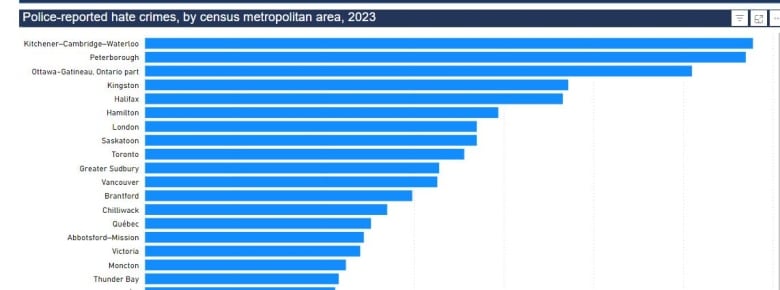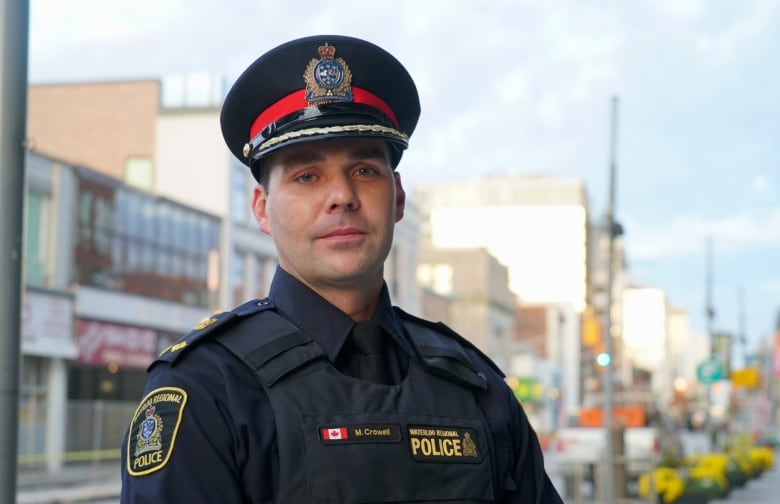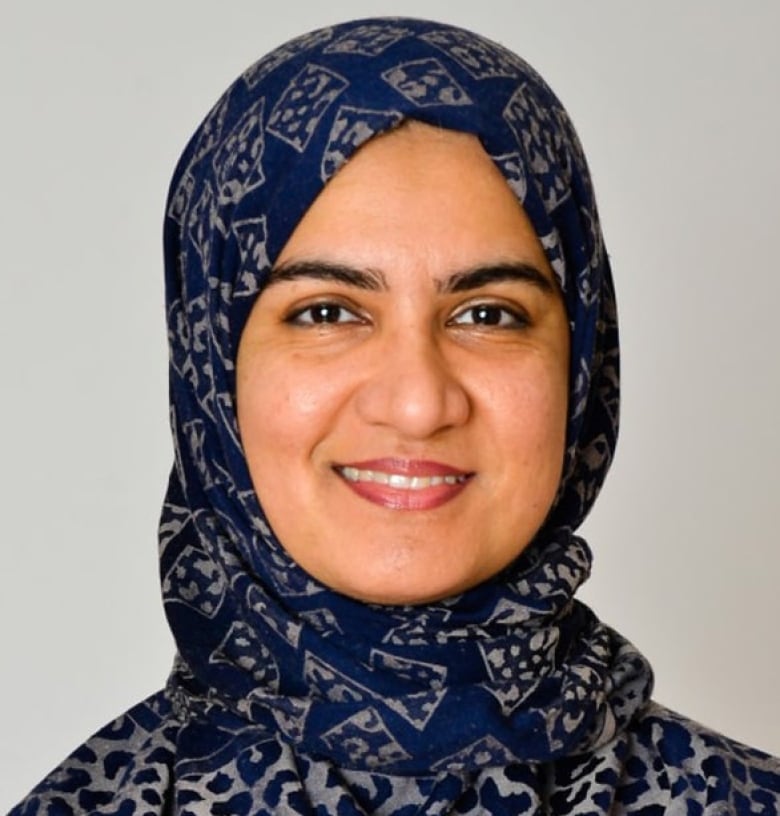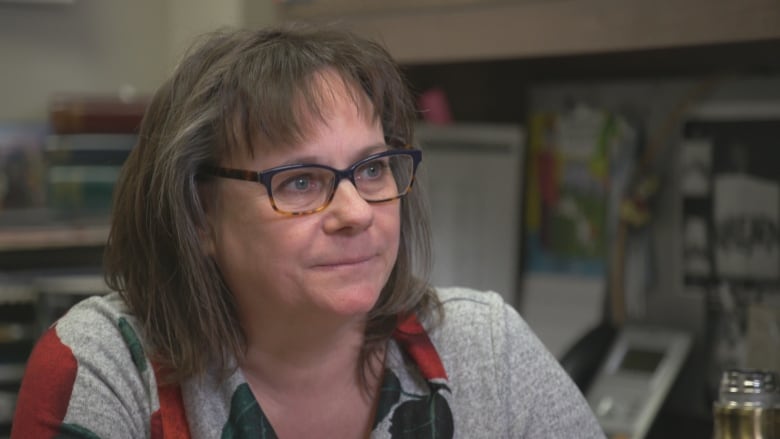
New Statistics Canada data indicates Waterloo region in southern Ontario had the highest rate of police-reported hate crimes in the country in 2023, prompting police and advocates to call for urgent action to deter hateful behaviour.
Responding to the federal agency’s findings, including that Waterloo region reported 34 hate crimes per 100,000 people last year, Chief Mark Crowell of the Waterloo Regional Police Service said it “causes great concern for us.” He also noted the numbers are also up at both the provincial and national levels.
Crowell said the hate-crime findings put the region “ahead of communities like Calgary [and] Edmonton.”
“Also, we had the highest rate per 100,000 citizens, so it’s of great concern and we’ve got some good things happening, but there’s a lot of work ahead of us.”

Giving a breakdown of the data, Crowell noted about 58 per cent of hate-reported crimes are non-violent — including mischief and offensive graffiti — while the other 40 per cent include offences like assaults, threats, harassment and arson.
According to the new data, issues such as a highly amplified political environment, polarization across social media and anti-newcomer and anti-immigrant sentiment are impacting social discourse in communities and ultimately community actions, Crowell said.
Additionally, he said, about half of the police-reported hate-motivated crimes revolve around ethnicity.
“About 50 per cent [in this category] are for Black individuals, and that’s startling,” Crowell said, adding “anti-Black racism exists in our community to a significant degree.”

Seventeen per cent of police-reported hate motivated crimes are against members of the South Asian community, while 16 per cent are for Arabic individuals, Crowell said about the data.
“About 18 per cent of the total hate crimes are targeting religion, but about 87 per cent of those target the Jewish community — so antisemitism. About 13 per cent toward the Muslim religion and Islam is identified,” Crowell said.
“The next highest category of those impacted is for sexual orientation. So, the stats show us that hate-motivated crimes targeting the 2SLGBTQ+ community broadly make up a significant portion.”
Anti-2SLGBTQ+ hate on the rise
Scott Williams is executive director of Spectrum, an organization supporting 2SLGBTQ+ individuals in Waterloo Region and the broader community. It provides peer support, community partnerships, education and training, resources and events.
Williams said the data confirms what the organization knew all along — that hate is on the rise in Waterloo region.
“Unfortunately, these results come as no surprise to us,” Williams wrote in an email to CBC News.
“We know from our participants that anti-2SLGBTQIA+ hate is on the rise in our community.
“At times like these, we need our allies to step up and help to educate people on 2SLGBTQIA+ issues and help us work toward an inclusive community where all 2SLGBTQIA+ individuals are welcomed, celebrated and supported as their authentic selves,” said Williams.
Worries the numbers could be even higher
Responding to the report, Sarah Shafiq, director of advocacy, research and outreach with the Coalition of Muslim Women of K-W, said “this is really concerning” for a “really diverse” community where almost 25 per cent of the population is racialized people.
“This hate around any identity, any group, is really unacceptable,” she told CBC News.

Shafiq is worried the number of hate crimes in Waterloo region could be even higher than what’s been presented in the Statistic Canada report.
“I’d like to emphasize that certain communities are not comfortable reporting cases to the police, so the numbers and what we see do not really give us a true picture of exactly what’s going on,” she said.
“Certainly those from racialized communities generally are [not comfortable], and then specifically, Arab communities are not comfortable.
“They don’t have that trusting relationship with the police to file reports of hate that they have experienced, and so the numbers are quite misleading when one solely relies on police-reported data.”
‘Tip of the iceberg’
The Caribbean Canadian Association of Waterloo Region (CCAWR) is “saddened and disturbed” by the report’s findings, the group’s president said.
“Individuals and families are being subjected to targeted attacks and human rights violations because of their ethnicity, religion, backgrounds or other prohibited grounds of discrimination in the Canada Human Rights Act,” Lannois Carroll-Woolery said.
“In 2023, one of our members was threatened by someone with an axe who demanded that he return to his home country.”
Only by acknowledging the cancer can we marshal the resources — human, financial, social — needed to make systemic change.– Lannois Caroll-Woolery, CCAWR president
Carroll-Woolery said “hate crimes are the proverbial tip of the iceberg.”
She said the report is “a call to action” for police, school boards, municipal governments and representative community associations.
“It’s time to stop pretending that racism and prejudice is not entrenched here. Only by acknowledging the cancer can we marshal the resources — human, financial, social — needed to make systemic change.”
The federal government has revealed funding for its action plan on combatting hate. The plan is a response to a rising number of hate incidents within Canadian communities, such as Islamophobia and antisemitism.
Barbara Perry, director of Ontario Tech University’s Centre on Hate, Bias and Extremism, said Waterloo region has been in the top 10 for police-reported hate crimes for a number of years, calling it “very disturbing.”
She noted Kitchener-Waterloo is one of those areas where law enforcement authorities, over the past few years, have been making a more concerted effort to encourage reporting.
Even so, she said, “that’s really not enough to explain the kind of increases that we’re seeing … there’s something else going on there.”
The federal government recently revealed funding for its action plan on combating hate, and Perry said this and other government efforts are important, especially in terms of funding work being done in local communities.
What is needed to turn the situation around “is to take advantage and leverage this new action plan and the funding that’s associated with it to engage in a whole raft of different kinds of strategies online and offline,” she said.

For his part, Crowell said, there’s “a little bit of silver lining” that comes with the Statistics Canada report.
“When we look at intimate partner violence, sexual violence, when we have a high degree of reporting, we can look at that, that our systems are working. That means there is trust and confidence in our institutions, people are stepping up, they’re coming forward and they do have faith that there are things that can be done through the reporting,” he said.
“At the same time, people are alarmed and we have one of the fastest-growing, the most diverse communities in all of Canada, so for people to feel safe and to be safe — we know that just one of these incidents can can shake an individual, a family, a neighbourhood indefinitely and their sense of safety in our community — there’s so much work we need to do.”
Crowell said Waterloo region’s community safety and well-being plan has identified battling hate as one of the top community priorities.
“The education can never stop. We know that none of us were born with hate in our hearts. We know that there’s ways that we can intervene with young people, especially to root out ignorance and some of these behaviours that lead to violence and the worst outcomes,” he said.
“It can’t be said enough that hate has no home in Waterloo region. We will continue to come together to try to break down every barrier, every silo, to unify and to build the systems that work.”
